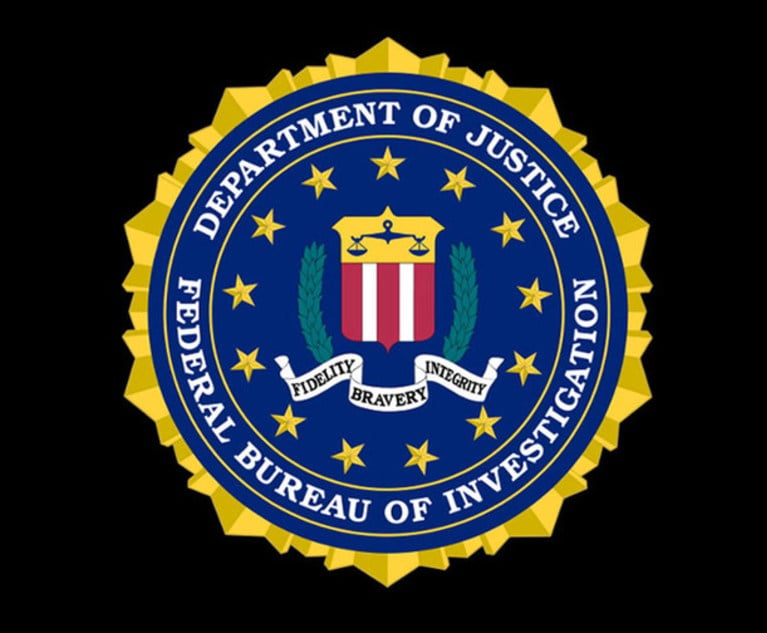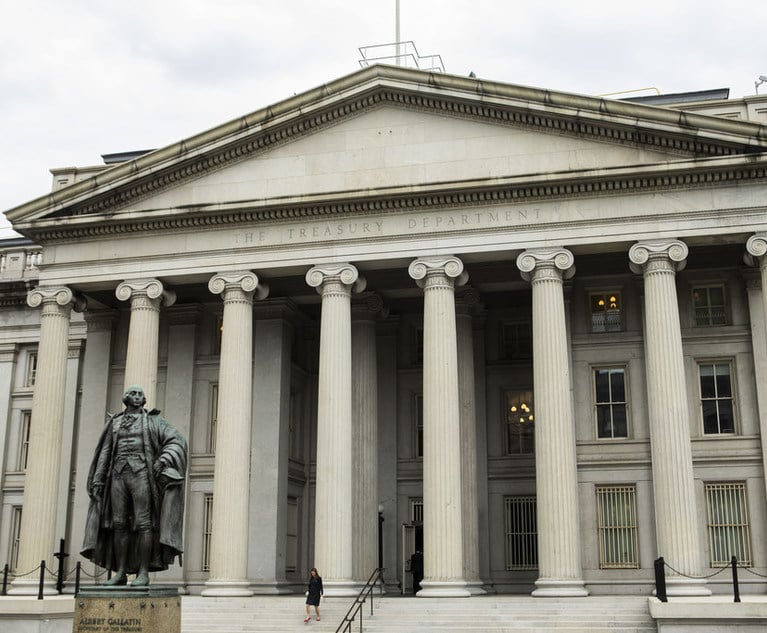Should Ginsburg Recuse in SCOTUS Travel Ban Case?
Dozens of GOP House members are calling on Justice Ruth Bader Ginsburg to recuse herself from the high-stakes case because of negative comments she made about Donald Trump before he was elected president. While Ginsburg may not be forced to withdraw, one law professor said she "has only herself to blame for the optics."
June 28, 2017 at 11:32 AM
5 minute read
Nearly 60 Republican members of Congress are demanding that U.S. Supreme Court Justice Ruth Bader Ginsburg recuse herself from the upcoming travel ban case because of the negative public comments she made about Donald Trump before he was elected president.
“As an associate justice of the Supreme Court, you are required to recuse yourself in cases in which your 'impartiality might reasonably be questioned' and where you have 'a personal bias or prejudice concerning a party,'” the 58 signers asserted in a letter sent to Ginsburg on Monday, citing excerpts from the federal recusal statute, 28 U.S.C. 455.
The letter added, “There is no doubt that your impartiality can be reasonably questioned; indeed, it would be unreasonable not to question your impartiality. Failure to recuse yourself from any such case would violate the law and undermine the credibility of the Supreme Court of the United States.” Ginsburg has not yet commented on or responded to the letter.
The call for recusal was triggered by the high court's announcement on Monday that it would hear arguments in October in Trump v. International Refugee Assistance Project, the dispute over Trump's executive order temporarily barring entry to the United States for certain foreign nationals.
The House letter references several statements made by Ginsburg in a series of press interviews last July, including one with The New York Times: “I can't imagine what the country would be with Donald Trump as president.” She also called Trump a “faker” in a CNN interview, and told the Associated Press she “did not want to think about” the possibility of Trump becoming president, “but if it should be, then everything is up for grabs.”
After a storm of criticism from across the political spectrum Ginsburg said in a statement that her comments were “ill-advised and I regret making them. Judges should avoid commenting on a candidate for public office.”
When asked about the House letter Tuesday, judicial ethics experts—while agreeing that Ginsburg's comments were a mistake—expressed doubt that Ginsburg will or must recuse.
“The letter from the House members is politically opportunistic,” said Hofstra University Maurice A. Deane School of Law professor James Sample. “Still, Justice Ginsburg has only herself to blame for the optics.”
One problem with the recusal request is that it was made by nonparties to the case. Though no rule prevents nonparties from urging recusal, it may not go over well with the justices, though Ginsburg alone decides whether or not to recuse. “The court is understandably loath to permit the disqualification process to be hijacked as a tool for interest groups to target disfavored judges,” said Charles Geyh, professor at Indiana University Maurer School of Law–Bloomington.
However the request was made, Sample said, recusal is not required. “Recusing in every case involving the Trump administration is institutionally impracticable,” he said. “While the travel ban is a signature Trump initiative, Justice Ginsburg's comments about Trump as an individual did not specifically address the travel ban, which, of course did not yet exist at the time.”
Sample added, “Were a case to come before the court that more directly involved President Trump as an individual party, the arguments for Justice Ginsburg's recusal would be stronger than they are here.”
The Ginsburg recusal request resonates, in some respects, with the 2004 controversy over the late Justice Antonin Scalia's refusal to recuse himself in Cheney v. United States District Court, a case before the high court involving the transparency of an energy advisory committee led by then-vice president Dick Cheney. Cheney, like Trump in the current case, was a named party.
The Sierra Club, a party to the case, filed a “motion to recuse” Scalia because of his relationship with Cheney, including the fact that they had recently gone on a duck-hunting vacation together. The motion stressed that because Cheney's “own conduct” in the case was at issue, the Scalia-Cheney friendship required recusal.
Bus Scalia, in an unusual public memorandum, responded that he would not recuse, stating that while “friendship is a ground for recusal of a justice where the personal fortune or the personal freedom of the friend is at issue, it has traditionally not been a ground for recusal where official action is at issue, no matter how important the official action was to the ambitions or the reputation of the government officer.”
If she responds to the House letter, Ginsburg could cite Scalia's words in refusing to recuse, even though her relationship with the named party is one of enmity rather than friendship.
The court's public information officer said Wednesday, “There has been no comment from the justice.”
Copyright The National Law Journal. All rights reserved. This material may not be published, broadcast, rewritten, or redistributed.
This content has been archived. It is available through our partners, LexisNexis® and Bloomberg Law.
To view this content, please continue to their sites.
Not a Lexis Subscriber?
Subscribe Now
Not a Bloomberg Law Subscriber?
Subscribe Now
NOT FOR REPRINT
© 2025 ALM Global, LLC, All Rights Reserved. Request academic re-use from www.copyright.com. All other uses, submit a request to [email protected]. For more information visit Asset & Logo Licensing.
You Might Like
View All
Supreme Court Agrees to Hear Lawsuit Over FBI Raid at Wrong House

Trump Seeks Pause of Supreme Court Cases, Disavows DOJ Stance on Voting Rights Act

Supreme Court Takes Up Case Over Approval of Religious Charter School

Supreme Court Reinstates Corporate Disclosure Law Pending Challenge
Trending Stories
- 1Midsize Firm Bressler Amery Absorbs Austin Boutique, Gaining Four Lawyers
- 2Bill Would Allow Californians to Sue Big Oil for Climate-Linked Wildfires, Floods
- 3LinkedIn Suit Says Millions of Profiles Scraped by Singapore Firm’s Fake Accounts
- 4Supreme Court Agrees to Hear Lawsuit Over FBI Raid at Wrong House
- 5What It Takes to Connect With Millennial Jurors
Who Got The Work
J. Brugh Lower of Gibbons has entered an appearance for industrial equipment supplier Devco Corporation in a pending trademark infringement lawsuit. The suit, accusing the defendant of selling knock-off Graco products, was filed Dec. 18 in New Jersey District Court by Rivkin Radler on behalf of Graco Inc. and Graco Minnesota. The case, assigned to U.S. District Judge Zahid N. Quraishi, is 3:24-cv-11294, Graco Inc. et al v. Devco Corporation.
Who Got The Work
Rebecca Maller-Stein and Kent A. Yalowitz of Arnold & Porter Kaye Scholer have entered their appearances for Hanaco Venture Capital and its executives, Lior Prosor and David Frankel, in a pending securities lawsuit. The action, filed on Dec. 24 in New York Southern District Court by Zell, Aron & Co. on behalf of Goldeneye Advisors, accuses the defendants of negligently and fraudulently managing the plaintiff's $1 million investment. The case, assigned to U.S. District Judge Vernon S. Broderick, is 1:24-cv-09918, Goldeneye Advisors, LLC v. Hanaco Venture Capital, Ltd. et al.
Who Got The Work
Attorneys from A&O Shearman has stepped in as defense counsel for Toronto-Dominion Bank and other defendants in a pending securities class action. The suit, filed Dec. 11 in New York Southern District Court by Bleichmar Fonti & Auld, accuses the defendants of concealing the bank's 'pervasive' deficiencies in regards to its compliance with the Bank Secrecy Act and the quality of its anti-money laundering controls. The case, assigned to U.S. District Judge Arun Subramanian, is 1:24-cv-09445, Gonzalez v. The Toronto-Dominion Bank et al.
Who Got The Work
Crown Castle International, a Pennsylvania company providing shared communications infrastructure, has turned to Luke D. Wolf of Gordon Rees Scully Mansukhani to fend off a pending breach-of-contract lawsuit. The court action, filed Nov. 25 in Michigan Eastern District Court by Hooper Hathaway PC on behalf of The Town Residences LLC, accuses Crown Castle of failing to transfer approximately $30,000 in utility payments from T-Mobile in breach of a roof-top lease and assignment agreement. The case, assigned to U.S. District Judge Susan K. Declercq, is 2:24-cv-13131, The Town Residences LLC v. T-Mobile US, Inc. et al.
Who Got The Work
Wilfred P. Coronato and Daniel M. Schwartz of McCarter & English have stepped in as defense counsel to Electrolux Home Products Inc. in a pending product liability lawsuit. The court action, filed Nov. 26 in New York Eastern District Court by Poulos Lopiccolo PC and Nagel Rice LLP on behalf of David Stern, alleges that the defendant's refrigerators’ drawers and shelving repeatedly break and fall apart within months after purchase. The case, assigned to U.S. District Judge Joan M. Azrack, is 2:24-cv-08204, Stern v. Electrolux Home Products, Inc.
Featured Firms
Law Offices of Gary Martin Hays & Associates, P.C.
(470) 294-1674
Law Offices of Mark E. Salomone
(857) 444-6468
Smith & Hassler
(713) 739-1250








